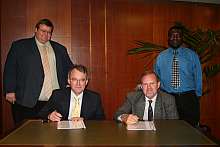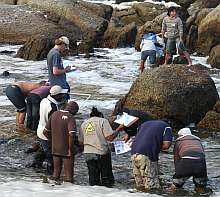University of Pretoria signs General Conditions of Participation agreement with SAEON
|
The University of Pretoria (UP) became the fifth institution to agree to the General Conditions of Participation in SAEON and the tenth official SAEON participant.
The agreement was signed by Prof Robin Crewe, Vice-Principal of UP and Johan Pauw, Managing Director of SAEON on 20 May 2008.
Prof Crewe was instrumental in the establishment of the Network in 2002 while he was still Dean of Natural and Agricultural Sciences at the University. He has followed SAEON’s progress with great interest ever since.
“The agreement offers a major opportunity for the University to benefit from opportunities for collaboration and the work done at the SAEON nodes,” says Prof Crewe, “and we hope that, in turn, the University can contribute to the long-term data sets generated by SAEON.”
Johan Pauw says that SAEON is delighted to sign the agreement with such a world renowned university. He says that the Network, as an umbrella facility for the nodes, has a number of protocols in place to cater for external researchers.
“SAEON has positioned itself to provide non-financial support for university researchers through the SAEON nodes,” he explains. This is a natural extension of SAEON as the organisation employs only a limited of researchers.
Official participant status
In terms of the agreement, UP staff, students, visiting scientists and collaborators gain official participant status in all the SAEON nodes. By signing the agreement, UP agreed to deliver data to SAEON that originates from the University's participation in the Network, other than data which is commercially sensitive or otherwise confidential in nature.
Participants in nodes benefit from the research and education platforms provided by the nodes. This means that nodes offer conceptual observation frameworks aimed at improving science and national quality of life, within which research may be executed. Collaborative research proposals with SAEON may thus claim to work towards national objectives and this should generally improve the chances of support by funding agencies.
In addition, research projects are subsidised by support services, equipment and access to registered research sites with organised data management systems. These advantages of SAEON-endorsed projects reduce the risks of failure, thus giving potential funding agencies more confidence in a project.
Data is shared among the participants through an electronic internet-based system which is about to be released for general use and population with data.
Participation in nodes is open to all institutions that agree to sign the General Conditions of Participation. Nodes can therefore be regarded as centres of gravity within the multi-institutional and multi-disciplinary research community that function neutrally in spite of being hosted by a specific organisation.
Integrative research hubs
The SAEON nodes have become exciting integrative research hubs abuzz with intellectual discourse and research activities. All of this requires good organisation and orderly business processes which is fast becoming a main concern of the node managers.
Through signing the agreement, organisations like UP are agreeing to abide by the rules of the respective nodes. Built into the structure of a node is a Node Liaison Committee with the specific aim of facilitating interaction between participants.
By signing the agreement, UP has joined the ranks of the University of Stellenbosch, CSIR, Mintek and the University of Cape Town, all of whom are signatories to the agreement. The hosts of the respective nodes - South African National Parks, South African Institute for Aquatic Biodiversity, Marine and Coastal Management of DEAT, the South African National Biodiversity Institute (SANBI) and Ezemvelo Kwazulu-Natal Wildlife - automatically became SAEON participants when they agreed to host the various nodes.
An array of SAEON partners such as various science institutions, the National Business Initiative, universities, government departments and conservation agencies are supporting SAEON through serving on its advisory structures and will in due course also sign the agreement as appropriate.
"Significantly," Johan says, "the General Conditions of Participation agreement formalises arrangements for participation under the auspices of a node. As each node has specific requirements based on its specific circumstances, this agreement is a high-level document covering all of the nodes, but it also does away with the need for numerous individual contracts. Node management is a shared responsibility between the Node Manager and the participants, and the Node Liaison Committee is the instrument by which participants make their contributions."
Although SAEON nodes are designed to provide an infrastructure for environmental observational research mainly used by visiting local and international researchers, a node is much more than the equipment it has. Nodes provide coordinating and service staff and are linked through an IT network. They provide the field stations or observatories required for research on environmental change.
"These observatories are the laboratories of in situ ecosystem research," says Johan. "Because the systems ecologist's laboratory is the field, this is an important innovation to enhance research progress incrementally through the sharing of research sites, agendas, infrastructure, equipment and data sets." Johan emphasizes the vision that nodes are becoming "centres of gravity", attracting more resources and intellectual capacity than provided for by the core support rendered by SAEON. They are also supported by in-kind contributions from partner organisations.
Consolidating environmental observation networks
The accession agreement with UP will cement relationships that SAEON has already developed with individual UP researchers.
"It is gratifying to see SAEON's networks growing stronger by the day," says Johan. "It can only solidify SAEON's database from where information about our environment and its processes is disseminated, contributing to the sustained welfare of our people."












